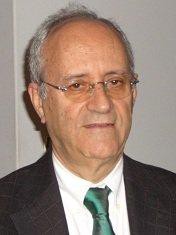abstract
A 20% substitution of Bi with La in the perovskite Bi1-xLaxFe0.5Sc0.5O3 system obtained under high-pressure and high-temperature conditions has been found to induce an incommensurately modulated structural phase. The room-temperature x-ray and neutron powder diffraction patterns of this phase were successfully refined using the Imma(0,0,gamma)s00 superspace group (gamma = 0.534(3)) with the modulation applied to Bi/La and oxygen displacements. The modulated structure is closely related to the prototype antiferroelectric structure of PbZrO3 which can be considered as the lock-in variant of the latter with gamma = 0.5. Below T-N similar to 220 K, the neutron diffraction data provide evidence for a long-range G-type antiferromagnetic ordering commensurate with the average Imma structure. Based on a general symmetry consideration, we show that the direction of the spins is controlled by the antisymmetric exchange imposed by the two primary structural distortions, namely oxygen octahedral tilting and incommensurate atomic displacements. The tilting is responsible for the onset of a weak ferromagnetism, observed in magnetization measurements, whereas the incommensurate displacive mode is dictated by the symmetry to couple a spin-density wave. The obtained results demonstrate that antisymmetric exchange is the dominant anisotropic interaction in Fe3+-based distorted perovskites with a nearly quenched orbital degree of freedom.
keywords
SUBSTITUTED BIFEO3; HIGH-PRESSURE; TRANSITIONS; CRYSTAL; PBZRO3
subject category
Physics
authors
Khalyavin, DD; Salak, AN; Lopes, AB; Olekhnovich, NM; Pushkarev, AV; Radyush, YV; Fertman, EL; Desnenko, VA; Fedorchenko, AV; Manuel, P; Feher, A; Vieira, JM; Ferreira, MGS
our authors
Groups
G2 - Photonic, Electronic and Magnetic Materials
G3 - Electrochemical Materials, Interfaces and Coatings
acknowledgements
This work was supported by project TUMOCS. This project has received funding from the European Union's Horizon 2020 research and innovation programme under the Marie Sklodowska-Curie grant agreement No. 645660.





